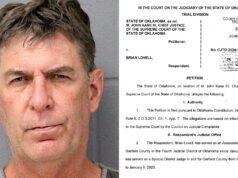
As they deal with the pressure of crafting a state budget by the end of the month, Oklahoma legislators are not the only politicians raising their dander this May. Two statewide elected officials, Attorney General Gentner Drummond and Treasurer Todd Russ, are involved in a spat over the outcome of a legal case and who should handle the litigation going forward.
That’s just one of the tidbits in this roundup of civic events that have occurred recently. Other items you’ll find below include the criminal sentencing of a former Byng Public Schools information technology specialist, the affirmation that Oklahoma voters will have the option of voting for an independent presidential candidate in November, an ethics complaint filed against an Oklahoma County commissioner and the State Department of Education’s hiring of an in-house lawyer, which ends uncertainty about who was representing the agency in legal matters.
Garfield County Judge Brian Lovell indicted for drive-by shooting
Garfield County Associate District Court Judge Brian Lovell, who faces eight Texas felony counts involving the discharge of a weapon, was also indicted Thursday by Oklahoma’s multi-county grand jury on charges related to firing a gun at the residence of his brother-in-law near Bison.
The indictment alleges that on Feb. 12, 2023, Lovell fired a weapon at his brother-in-law’s residence. Two days later, Lovell reported that a firearm was stolen from his vehicle.
Now, he faces one count of using a vehicle to facilitate the discharge of a firearm (drive-by shooting) and an alternative count of discharging a firearm into a dwelling. Both are felonies.
KFOR reported that the brother-in-law said the bullets struck a wall, window and oven, barely missing his son.
Lovell, 59, already faced eight felony counts of deadly conduct for a similar incident in Austin, Texas, on Sept. 11, 2023. Investigators allege he used the same gun, a Glock 23 .40-caliber, in both the Texas and Oklahoma shootings.
Former Byng Public Schools employee sentenced for stealing, trading, hoarding nudes
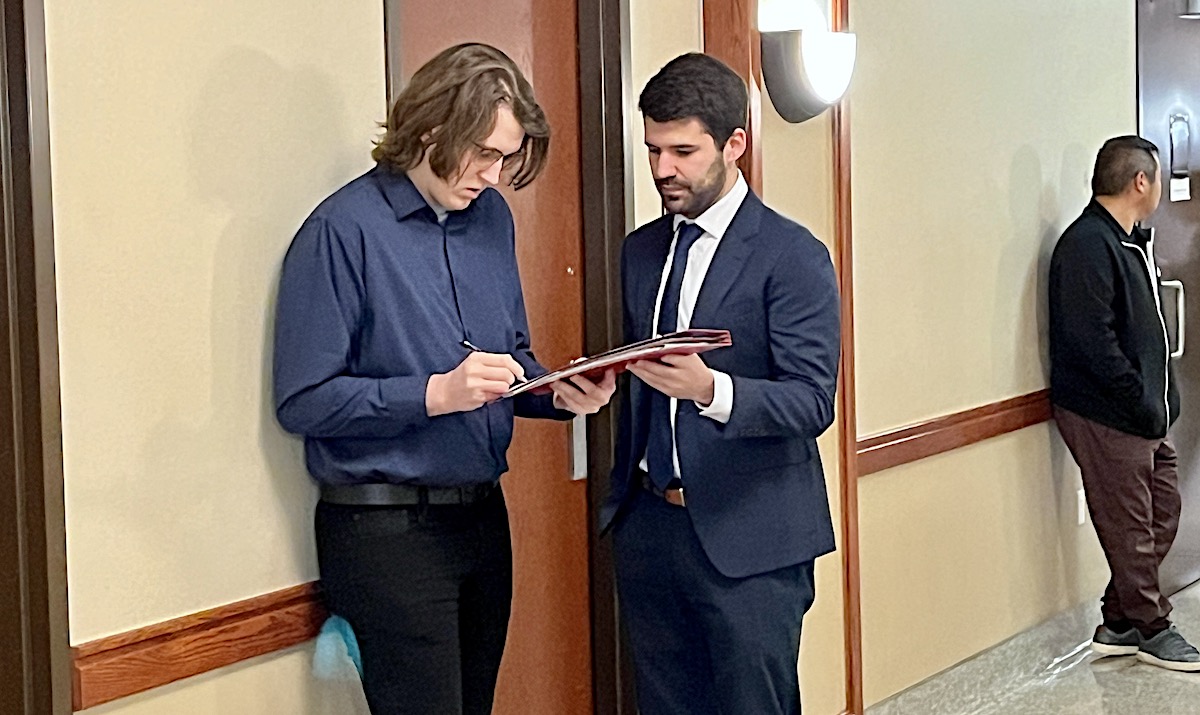
Zachary Milliren, a former information technology specialist for Byng Public Schools, received a 30-year prison sentence in Pontotoc County on Monday for a slate of charges including computer fraud, nonconsensual dissemination of private sexual images and possession of child pornography.
Milliren was initially charged in January 2023 with three criminal counts related to allegations that he accessed and stole a Byng teacher’s personal nude photos from her phone storage. After an Oklahoma State Bureau of Investigation inquiry that showed he had obtained nude photos or videos of at least 200 people in the Byng community — about one-seventh of the total population — Milliren faced additional charges.
Milliren pleaded guilty in late January 2024, and his sentence — including 30 years for showing obscene material to a minor and 20 years for possessing child pornography — was handed down Monday by District Court Judge Steve Kessinger.
District Attorney Erik Johnson released a statement following the sentencing hearing.
“I would like to thank the OSBI for their work on this case, and my prosecutor in this case, Tara Portillo, for bringing this case home and for her relentless advocacy for victims of Milliren’s abuse of his position and trust as an IT employee at Byng Public Schools,” Johnson said. “The exploitation of technology to commit these heinous offenses is an egregious violation of privacy and decency. Our office remains steadfast in our commitment to holding individuals accountable for such reprehensible actions and seeking justice for victims.”
According to court and investigatory documents, Milliren illegally obtained nude photos from devices he could access through his role at Byng Public Schools, from which he graduated only a few years earlier. Community frustration brewed as the investigation unfolded, with questions raised privately to public officials about why Byng students, parents and staff were not immediately notified of Milliren’s actions when they first came to light.
Investigators determined Milliren obtained additional photos by offering to trade nude images with students.
Epic hearing delayed again after attorney seeks recusal
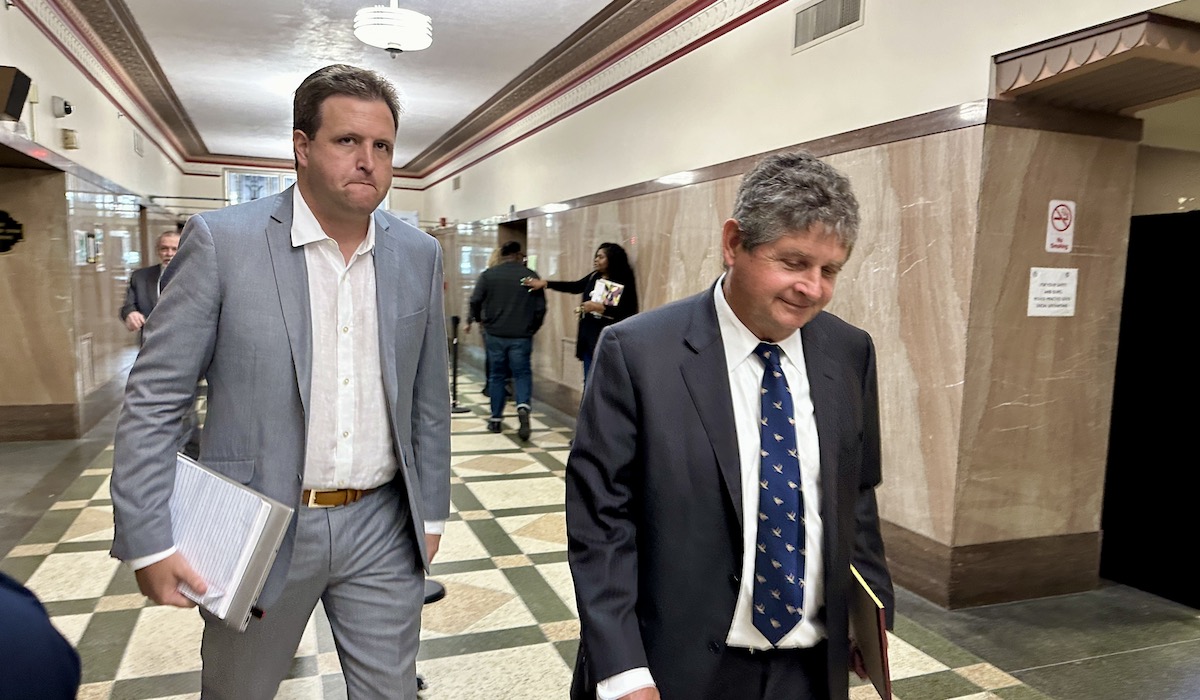
When the prosecutors, defense attorneys, defendants and members of the media returned Tuesday to Oklahoma County District Court Judge Jason Glidewell’s courtroom for what they thought would be the sixth day of a preliminary hearing involving former Epic Charter Schools’ former leaders, the only indication five weeks had passed since the hearing began was the lack of snow falling outside.
A week of testimony in March from a diverse cast of characters had laid out a case accusing Epic co-founders Ben Harris and David Chaney and former chief financial officer Josh Brock of carrying out a massive embezzlement scheme while they led the online charter school. The high-profile hearing came nearly two years after the men were both charged, and it featured Brock taking the stand to testify for the prosecution with a plea deal.
But despite 30 hours of testimony, Brock was still on the stand at 5 p.m. Friday, March 29. After a somewhat heated discussion with attorneys, Glidewell reset the hearing for May 7 and 8.
On May 7, Harris, Chaney, their attorneys, prosecutors and media members reassembled in Glidewell’s courtroom for a continuation of the hearing that began six weeks previously.
But after a meeting among attorneys in the judge’s chambers, Glidwell announced the hearing would be delayed further because Brock’s attorney had filed a motion asking Chaney’s attorney, Gary Wood, to recuse owing to a conflict of interest discovered “in the last week and a half.”
Glidewell gave Wood until June 10 to reply to the motion, and he set the recusal question for a hearing July 25.
In his motion, Irven Box said Wood had also previously represented Brock — as well as Harris and Chaney — and that Woods’ cross-examination of Brock would constitute a conflict of interest.
“During the nearly four years of Wood representing Brock, Chaney and Harris, Brock revealed confidential and privileged information to Wood,” Box wrote. “The present matter before the court is not just a substantially related matter, it is the identical matter Wood counseled and advised Brock, Chaney and Harris between 2019 and 2023 and which Brock revealed confidential and privileged information to Wood. Brock’s interests are materially adverse to those of Chaney and Davis.”
Wood disagreed with Box’s claim.
“I never represented Brock,” Wood said Tuesday.
He said Brock was represented by another lawyer when the charges were filed in 2022. The delay in proceedings means Harris, Chaney and Brock officially will not have entered a plea in the case more than two years after they were charged in June 2022.
Judge stays request for St. Isidore to produce deponents
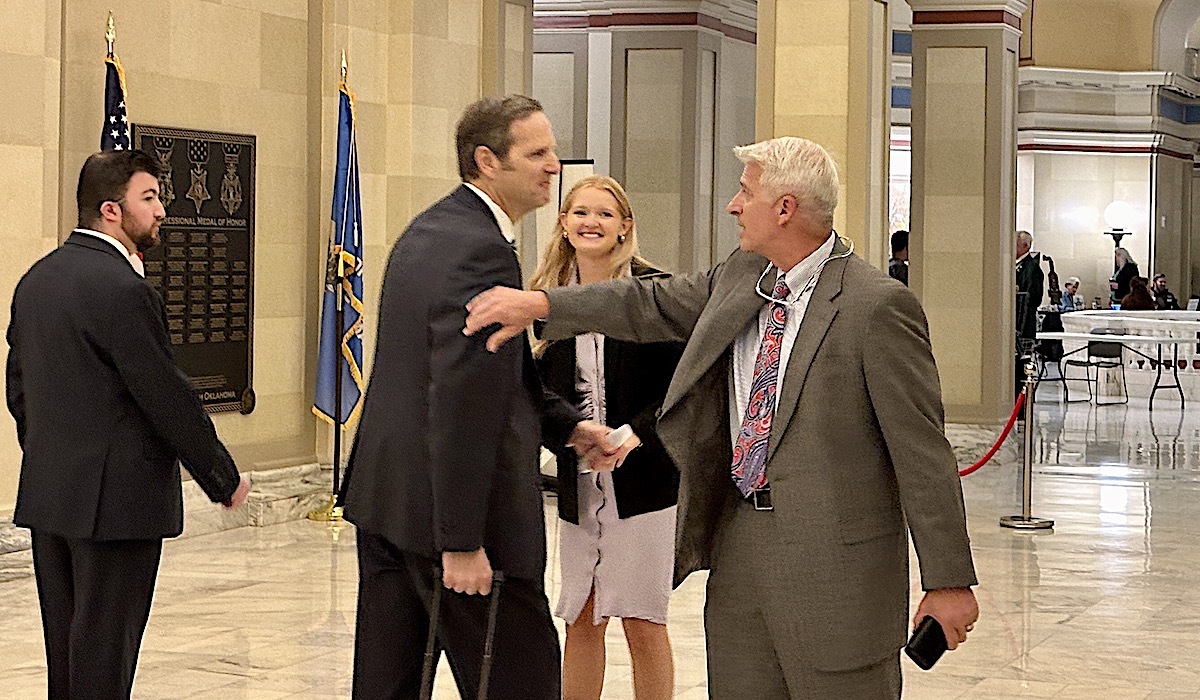
In a short hearing Wednesday, an Oklahoma County District Court judge declined to require a potential new Catholic virtual charter school to produce people for a deposition and scheduled an evidentiary hearing for another matter in late July.
At issue in the case filed last July is St. Isidore of Seville Catholic Virtual School, a charter school set to open for its first semester in August. If it does so and welcomes students into classrooms, it will become the first religious charter school in the nation. Charter schools are public schools that can be privately run.
But the school is facing two separate legal challenges: one from Attorney General Gentner Drummond, which is pending before the state Supreme Court, and one from a group of 10 plaintiffs in Oklahoma County District Court.
Attorneys for the plaintiffs as well as defendants OSDE, the Statewide Virtual Charter School Board and St. Isidore of Seville Catholic Virtual School argued two motions before Oklahoma County District Court Judge Richard Ogden on Wednesday. One motion involved the plaintiffs’ request that St. Isidore produce deponents, and the other was the school’s request that Ogden issue a protective order enjoining the matter until other questions — such as motions for dismissal and the case before the Oklahoma Supreme Court — are decided.
The plaintiffs’ lawyers had asked Ogden to require St. Isidore to produce deponents so they could craft a motion for a temporary injunction against the school.
Ogden issued what he called a narrow ruling, saying other factors such as the Supreme Court case and constitutional questions of the school were not relevant to Wednesday’s hearing.
“The court needs to determine if it has subject-matter jurisdiction,” Ogden said, referring to one of the defendants’ arguments in their motion to dismiss the case. “That is my narrow ruling — it should not be interpreted to go beyond that.”
Ogden will likely rule on other issues in the case after a June 5 hearing over the defendants’ motion to dismiss.
“I thought it was a mixed bag,” said Alex Luchenitser, one of the plaintiffs’ attorneys, after the hearing. “We really appreciate how the court is taking the case very seriously.”
Phil Sechler, senior counsel with the national conservative organization Alliance Defending Freedom which is assisting the SVCSB, had a similar tone.
“I thought today went well. We didn’t think the deposition was appropriate at this point in time, given our motions to dismiss the entire case because the court doesn’t have jurisdiction over it,” Sechler said. “Therefore, we think that the court is proceeding in a very appropriate fashion.”
Although the motion had not been filed Wednesday, the parties in the case also set dates for an evidentiary hearing regarding the plaintiffs’ planned request for a temporary injunction against the school.
Because Ogden declined to allow depositions at this point in proceedings, Luchenitser requested the hearing to try to present the judge with the same information he had hoped to gain from the deposition. Luchenitser said he planned to submit the motion by the end of the month. The hearing is scheduled for late July.
Judge halts oil, gas law; AG fires attorney of state treasurer, who says AG refused to take case
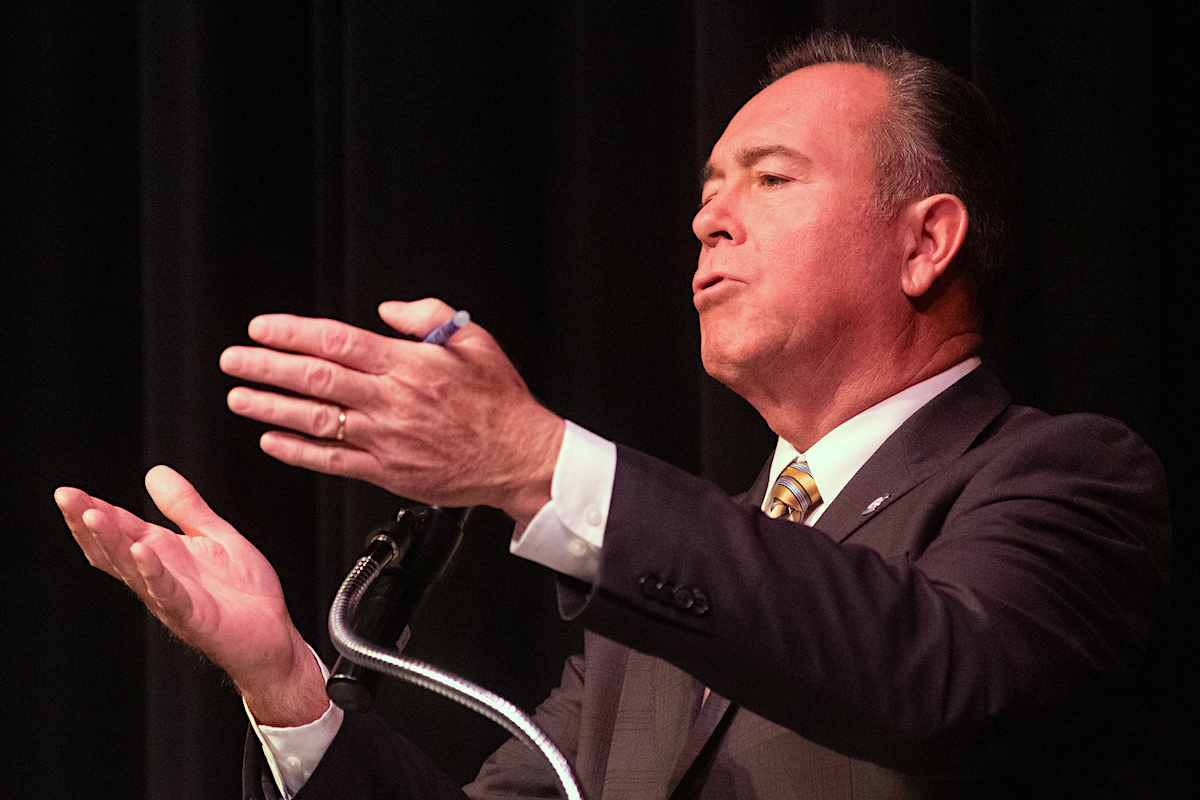
On Tuesday, Oklahoma County District Court Judge Sheila Stinson granted a temporary injunction against a state law passed in 2022 requiring state financial institutions to divest from organizations that “boycott” energy companies dealing with fossil fuels.
By Thursday, Attorney General Gentner Drummond had responded by terminating State Treasurer Todd Russ’ hand-picked legal counsel, saying in a press release he was also removing Russ from any decision-making authority in the lawsuit defending Oklahoma’s so-called anti-ESG (environmental, social and governance) law.
Created by House Bill 2034, the law prohibits state contracts and pension system investments with financial institutions that have internal policies to the detriment of the oil and gas industry.
Documents filed in the case show the attorney representing Russ’ office at first was Cheryl Plaxico, of Oklahoma City. On Thursday, Drummond filed notice that, moving forward, his office will be handling the case, which was brought against Russ by a former pension system board member in November.
“It is extremely disappointing that the counsel hired by Treasurer Russ was unable to secure a favorable ruling in defense of Oklahoma’s anti-ESG law,” Drummond said in a press release. “Because of this failure, the law is now on hold and at risk of being struck down entirely. Oklahomans deserve better.”
In his own press release, Russ responded that, before he selected counsel to represent his office in the case, he first requested Drummond’s office to handle the matter. Russ said he was informed by Drummond’s chief of staff, Trebor Worthen, that they were declining to take the case but would recommend outside counsel. Russ said he personally approached Drummond, a fellow Republican, to defend his office in the case but that the AG’s office responded by recommending a different choice in counsel. As a result, Russ said he then selected his own outside counsel.
Worthen said Friday that when the lawsuit was filed, the AG’s office was extremely busy and hired an outside law firm to partner with its solicitor general’s unit to defend the case.
“At no point did we decline representation,” Worthen said. “I spoke with the treasurer’s chief of staff, and she indicated that that sounded good. She didn’t think the treasurer would have any problems with it, but subsequently the treasurer spoke with Gentner and insisted that he be allowed to choose his own counsel and essentially take the lead on the case.”
Drummond agreed and approved Russ’s request to hire Plaxico, Worthen said. The AG’s office had no issues with Russ’s selection, he said.
“I think that generally speaking, at least the attorneys that I’ve spoken with in our office think highly of Ms. Plaxico and her abilities,” he said.
Plaxico is the ex-wife of former Attorney General Mike Hunter, who resigned in 2021. Hunter defeated Drummond in the 2020 Republican primary. Since taking office in 2023, Drummond has been critical of Hunter’s tenure.
Worthen said Drummond’s opinion of Hunter does not extend to Plaxico.
“Well, I can assure you that to the extent that Drummond and Mike Hunter ever had trouble from their relationship, that would not extend to Mr. Hunter’s ex-wife,” Worthen said.
The lawsuit was filed by Don Keenan, a former Oklahoma Public Employee Retirement System board member. The suit alleged that Oklahoma divesting from numerous national financial firms — like Black Rock, Bank of America and Wells Fargo — would harm retirees with accounts managed by such firms. Keenan has also served as president of the Oklahoma Public Employees Association and has been a member of its board of directors.
“As a retiree under the OPERS system, Mr. Keenan does object to his retirement benefits being depleted because the treasurer believes that making political statements with retiree dollars is more important than taking care of retirees themselves,” attorney Collin Walke wrote in Keenan’s petition.
A series of filings ensued, including Keenan’s motion for a temporary injunction and a motion from Russ to dismiss the lawsuit. Stinson, the judge, denied Russ’ motion to dismiss in February.
Three months later, Stinson granted the temporary injunction.
“This court finds that plaintiff has established by clear and convincing evidence that the threat of injury outweighs any threatened harm to the defendant, and further, that a temporary injunction would serve the public interest,” Stinson wrote in her order. “The court hereby grants temporary injunction against the enforcement of the Oklahoma Energy Discrimination Act of 2022, based on plaintiff’s claims of violation of exclusive benefit and vagueness. Temporary injunction is denied as to plaintiff’s claims of freedom of speech and special law/barrier to the court.”
In his press release, Drummond said he now regrets giving Russ the “professional courtesy” of choosing outside counsel.
“Treasurer Russ was insistent that he be allowed to choose his own counsel to defend the lawsuit, and I acquiesced,” said Drummond. “No longer will I allow professional courtesy to influence my decisions on this matter. Effective immediately, I have terminated Treasurer Russ’s hand-picked counsel and removed the treasurer from any decision-making role in the lawsuit. My office will handle all elements of the case moving forward.”
Russ said Drummond may be overstepping his authority by trying to remove him from the lawsuit, something Gov. Kevin Stitt alleged after Drummond moved to take over his representation in a federal gaming compact lawsuit filed by tribal nations against Stitt and other defendants.
“My constitutional office as the state treasurer makes me party to the lawsuit, and therefore I don’t believe my decision-making authority can be removed,” Russ said. “Certainly, I am disappointed with the outcome but have several facts for appeal. I had hoped to have the attorney general as my defender all along.”
Robert F. Kennedy Jr. qualifies for ballot in Oklahoma

Robert F. Kennedy Jr., 70, completed his statement of candidacy and paid Oklahoma’s $35,000 fee to appear on the presidential ballot in November, State Election Board officials confirmed Thursday. Kennedy, an independent, is the first candidate officially certified by the Election Board to be on the ballot in Oklahoma this November.
Independent presidential candidates in Oklahoma must file a statement of candidacy with the Election Board by July 15. They must file a petition signed by at least 34,599 voters or pay $35,000, and they must select seven electors from the state for the electoral college. Vice presidential candidates must be submitted by Aug. 21.
Kennedy opted to pay the $35,000, according to a campaign press release. He also certified his running mate as Nicole Shanahan, an attorney and businesswoman from California. The nominees for the Republican, Democratic and Libertarian parties will also appear on the November ballot because those parties maintain ballot access in the state.
If he’s successful in his long-shot bid in Oklahoma, presidential electors who would cast votes for Kennedy as part of the Dec. 17 Electoral College are: Aaron Simpkins, David Madden Givens Jr., Jeffrey Walter Lasky, Kenyon Milton Morgan, Nancy K. Owens, Susan Warmker Parker and Tricia L. Butcher.
An April 11-12 poll of 615 likely Oklahoma voters conducted by Cygnal found Kennedy polling at about 7 percent when voters were asked to choose from a field also including Donald Trump, Joe Biden, Jill Stein and Cornel West.
The record for best third-party candidate performance in an Oklahoma presidential election is Ross Perot’s third place finish in 1992, with about 23 percent of the vote. The only other third-party candidate to ever receive more than 20 percent of the vote in Oklahoma was George Wallace in 1968.
OSDE fills vacant general counsel position
The State Department of Education has finally hired an in-house lawyer, ending months of uncertainty about who was representing the agency in legal matters.
According to OSDE’s lawsuit filed Monday against the U.S. government over Title IX rules, which appeared on the federal court filing system Tuesday, Michael Beason is the new general counsel for the department.
Beason is a former Altus-based family law attorney who served as an assistant district attorney in the past. According to his bio on Justia Law, Beason graduated from the Southern Methodist University Dedmon School of Law.
His Justia bio page further describes Beason as an attorney with experience in divorce, criminal, appellate, elder, municipal and DUI legal matters. He does not list any experience with education on that page or on his Facebook page.
Ethics complaint filed against Oklahoma County commissioner

Midwest City Council member and criminal justice reform activist Sara Bana has filed a complaint with the Oklahoma Ethics Commission against Oklahoma County District 3 Commissioner Myles Davidson over a failure to file campaign finance reports, which Davidson has acknowledged.
“It is my understanding that any and every donation to a campaign, as well as any monies spent on behalf of a campaign, must be reported every quarter and that even if there have been no campaign contributions or expenditures during that period, an inactivity report shall be submitted,” Bana wrote in her complaint to the Ethics Commission. “I have knowledge of at least one fundraising event which was held in 2023 and another was held in March 2024. There have been numerous elected officials in the news the last few years who have been required to pay considerable fines because their reports were simply filed late.”
Davidson told The Oklahoman it was his responsibility to file the reports.
“It’s ultimately on me to ensure I am up to date on finance reports,” he said. “I am in the process of filing amended documentation that shows my past campaign finance records. I am happy to correct any wrongdoings and pay fines handed down from the Ethics Commission.”
The Oklahoma Ethics Commission is in a blackout period for accepting new complaints because 2024 is an election year. That provision is intended to prevent the complaint process from being used for political purposes during a campaign.
But Davidson is not up for re-election this year, so Bana’s complaint will be processed by the commission, which met Friday and voted to authorize further action in a separate case that could be revealed publicly if court filings are ultimately made.
OKCPD launches mental health initiative
While information remains scant about a U.S. Department of Justice investigation into whether Oklahoma and OKC adequately provide community-based mental health resources to those facing arrest, the Oklahoma City Police Department has launched a mental health response protocol guide for officers and other employees.
The 22-page guide was developed to help officers and 911 dispatchers respond to those experiencing mental health crises. Topics covered in the guide include how to recognize people in crisis, processes for 911 intake and diversion, police response, tools, resources and arrest alternatives.
“These protocols provide employees with clear guidance to ensure optimal services are delivered to people experiencing a mental health crisis,” retiring OKCPD Chief Wade Gourley said in a statement. “Having a diverse array of tools at our disposal enables us to effectively aid residents in safely navigating crises and guide them toward resources that will support their path to recovery.”
The department has faced criticism in the past over how it deals with those dealing with mental illness. In 2020, officers fatally shot Bennie Edwards in northeast OKC in front of a strip mall. Edwards appeared to be experiencing psychosis before the shooting and had a long history of documented mental illness. An autopsy revealed that Edwards had paper stuffed into his ears at the time of his death.
According to reports, the officers involved in that incident lacked crisis intervention training.
(Correction: This article was updated at 1 p.m. Sunday, May 12, to correct reference to Don Keenan’s attorney.)














